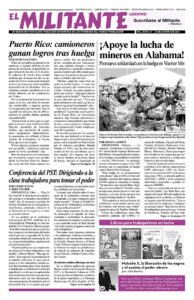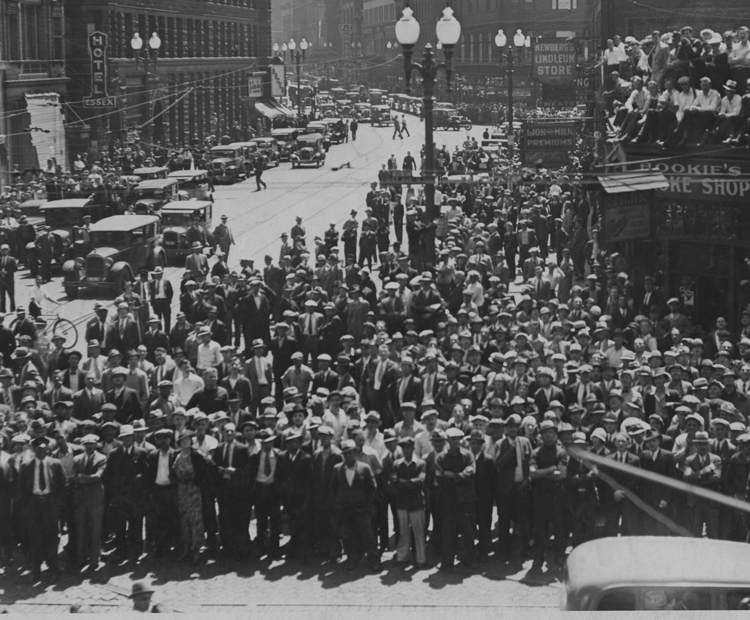This excerpt is from Teamster Power by Farrell Dobbs. The Spanish edition is one of Pathfinder’s Books of the Month for August. The book tells how members of Teamsters Local 574 learned to wield union power through three 1934 strike victories in Minneapolis. Under class-struggle leadership, the Teamsters extended their union throughout the Upper Midwest, helped organize other unions and the unemployed, forged alliances with farmers and owner-operators, and strove for working-class political independence. The book is the second in a four-part series by Dobbs, who emerged from the ranks to become organizer of the Teamsters’ 11-state campaign to unionize over-the-road truckers in the Midwest. Dobbs went on to serve as national secretary of the Socialist Workers Party from 1953 to 1972. The excerpt is from the chapter “Class-Struggle Policy.” Copyright © 2008 by Pathfinder Press. Reprinted by permission.
Workers who have no radical background enter the trade unions steeped in misconceptions and prejudices that the capitalist rulers have inculcated into them since childhood. This was wholly true of Local 574 members. They began to learn class lessons only in the course of struggle against the employers.
Their strike experiences had taught them a good deal. Notions that workers have anything in common with bosses were undermined by harsh reality. Illusions about the police being “protectors of the people” began to be dispelled. Eyes were opened to the role of the capitalist government, as revealed in its methods of rule through deception and brutality. At the same time the workers were gaining confidence in their class power, having emerged victorious from their organized confrontation with the employers. …
These endeavors stood in marked contrast to the policies of bureaucratic union officials. Bureaucrats don’t look upon the labor movement as a fighting instrument dedicated solely to the workers’ interests; they tend rather to view trade unions as a base upon which to build personal careers as “labor statesmen.”
Such ambitions cause them to seek collaborative relations with the ruling class. Toward that end the bureaucrats argue that, employers being the providers of jobs, labor and capital have common interests. They contend that exploiters of labor must make “fair” profits if they are to pay “fair” wages. Workers are told that they must take a “responsible” attitude so as to make the bosses feel that unions are a necessary part of their businesses. On every count the ruling class is given a big edge over the union rank and file.
In carrying out their class-collaborationist line, the union bureaucrats exercise tight control over negotiations with employers. They try to avoid strikes over working agreements if at all possible. When a walkout does take place, they usually leap at the first chance for a settlement.
Once a contract has been signed with an employer they consider all hostilities terminated. Membership attempts to take direct action where necessary to enforce the agreement are declared “unauthorized” and a violation of “solemn covenants.” In fact the bureaucrats often gang up with the bosses to victimize rebel workers.
Local 574’s leadership flatly repudiated the bankrupt line of the class collaborationists. There can be no such thing as an equitable class peace, the membership was taught. The law of the jungle prevails under capitalism. If the workers don’t fight as a class to defend their interests, the bosses will gouge them. Reflecting these concepts, the preamble to the new by-laws adopted by the local stated:
“The working class whose life depends on the sale of labor and the employing class who live upon the labor of others, confront each other on the industrial field contending for the wealth created by those who toil. The drive for profit dominates the bosses’ life. Low wages, long hours, the speed-up are weapons in the hands of the employer under the wage system. Striving always for a greater share of the wealth created by his labor, the worker must depend upon his organized strength. A militant policy backed by united action must be opposed to the program of the boss.
“The trade unions in the past have failed to fulfill their historic obligation. The masses of the workers are unorganized. The craft form has long been outmoded by gigantic capitalist expansion. Industrial unions are the order of the day.
“It is the natural right of all labor to own and enjoy the wealth created by it. Organized by industry and prepared for the gruelling daily struggle is the way in which lasting gains can be won by the workers as a class.” …
If a union is poorly led, the bosses will violate their promises, undermine the contract in daily practice, and put the workers on the defensive. Conversely, a properly led union will strive to enforce the contract to the letter. …
Another matter related to these basic considerations is the length of time working agreements are to remain in effect. Class-collaborationist union officials, who yearn for stable worker-employer relations, favor long term agreements. They want to keep the membership locked up in a given status-quo situation for the longest possible time. Militant union leaders, on the other hand, prefer relatively short term contracts, so that gains for the membership can be registered more frequently.
In Local 574’s case the general practice was to limit agreements to a period of one year. This applied both to the negotiation of renewal terms when the August 1934 strike settlement expired later on and to the signing of contracts with companies whose employees were newly organized. …
Retention of the unqualified right to strike and readiness to use the weapon were central to the local’s enforcement of the 1934 settlement with the trucking firms. Employer attempts to impose arbitration of workers’ grievances were brushed aside. There had to be full and immediate compliance with the settlement terms — or else.


